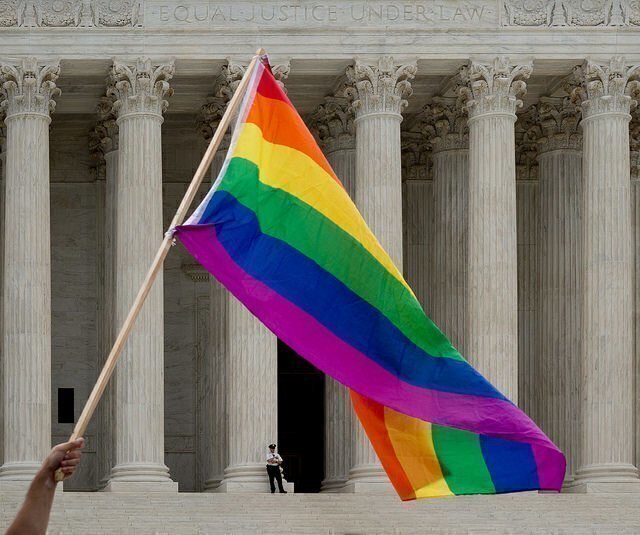
In the wake of the Supreme Court’s decision in Obergefell v. Hodges, lawmakers in Congress have felt pressure to either solidify or challenge its gains on their own terms. Fallout from the Court’s ruling has shone light on the nation’s complicated array of laws governing LGBT rights, and both Democrats and Republicans are seizing on the opportunity to strike a national blow.
The key debate is whether individuals and groups have the First Amendment right to express their beliefs about gay marriage by withholding services or employment, or whether civil rights protections should be extended to same-sex couples in the workplace and community.
Two competing bills in Congress, sponsored by members of each party, look to address the issue.
Republicans, who control both houses of Congress, have introduced the First Amendment Defense Act. This bill would prevent the federal government from taking “any discriminatory action against a person, wholly or partially on the basis that such person believes or acts in accordance with a religious belief or moral conviction that marriage is or should be recognized as the union of one man and one woman, or that sexual relations are properly reserved to such a marriage.” (In this case, “person” is defined as a human, non-profit, or for-profit group, who could not have tax exempt status revoked or federal contracts terminated because of their particular views.)
Authored by Senator Mike Lee of Utah and Representative Raúl Labrador of Idaho, the Act was inspired, in part, by a question posed by Justice Samuel Alito during oral arguments in the Obergefell case.
The Justice referred to a case in which the IRS removed Bob Jones University’s tax-exempt status because it banned interracial dating at the school—a rule that the government viewed to be against established law. Alito asked Solicitor General Donald Verrilli if the same principle could be applied to a college which denounced homosexuality or gay marriage, leading to this awkward response:
You know, I don’t think I can answer that question without knowing more specifics, but it’s certainly going to be an issue. I don’t deny that. I don’t deny that, Justice Alito. It is – it is going to be an issue.
Indeed, the bill may limit the liberty afforded to same-sex couples. For example, the ACLU has concluded that a federal employee could refuse to process documents for someone who identifies as gay or lesbian. Basic services that most people take for granted could become harder to obtain.
The Democrats, for their part, have introduced the Equality Act. Sponsored by Senators Jeff Merkley of Oregon, Tammy Baldwin of Wisconsin and Cory Booker of New Jersey, and Representative David Cicilline of Rhode Island, the bill essentially extends the protections of the Civil Rights Act of 1964 to members of the LGBT community.
The sweeping legislation would ban discrimination in housing, education, employment, federal funding, jury service and more. In addition to amending Title VII of the Civil Rights Act, the bill would also amend the Government Employees Rights Act of 1991, the Civil Service Reform Act, the Equal Credit Opportunity Act and the Jury Service and Selection Act to reflect the status of LGBT people as a protected class.
Indeed, same-sex marriage may now be legal in all states, but that does not mean that gay couples have achieved full equality. As Rep. Cicilline and other Democratic leaders have noted, “in most states, a same-sex couple can get married on Saturday, post pictures on Facebook on Sunday, and then risk being fired from their job or kicked out of their apartment on Monday.”
Together, the bills represent the first wave of efforts to grapple with the challenges of a post-Obergefell world.
Yes, the June ruling was a big victory for the LGBT community, but Congress retains enormous power to shape the quality of life for all citizens—straight, gay or otherwise.
On the one hand, we must protect the First Amendment freedoms of speech and religion. On the other hand, no American citizen should be subject to unfair discrimination.
The chance of success for either proposal is dubious at best; the minority Democrats will get little to no Republican support for their bill, and even if the Republicans pass their legislation, President Obama is likely to veto it. Still, these initiatives set the table for many debates to come.
Will Field is an intern at the National Constitution Center.







